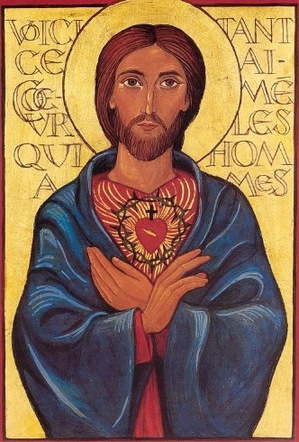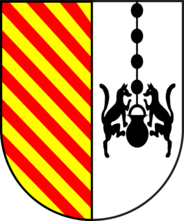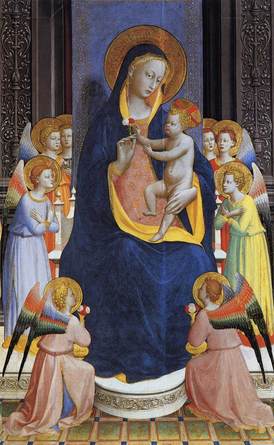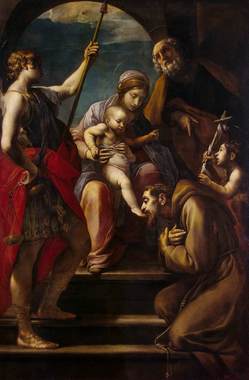It bears reading and knowing what the Church advocates with regard to the Sacred Heart of Jesus. Why? Because we are meant to be in relationship with God through Jesus by the power of the Holy Spirit. We live in relation (communio) to Jesus –as Savior, brother, Redeemer, lover– through whom we see the face of God. In The Directory on Popular Piety and the Liturgy tells us:
The Roman Pontiffs have frequently averted to the scriptural basis of devotion to the Sacred Heart of Jesus.

Jesus, who is one with the Father (cf. John 10, 30), invites his disciples to live in close communion with him, to model their lives
on him and on his teaching. He, in turn, reveals himself as “meek and
humble of heart” (Mt 11, 29). It can be said that, in a certain sense,
devotion to the Sacred Heart of Jesus is a cultic form of the prophetic and evangelic gaze of all Christians on him who was pierced (cf. John 19, 37; Zac 12, 10), the gaze of all Christians on the side of Christ, transfixed by a lance, and from which flowed blood and water (cf. John 19, 34), symbols of the “wondrous sacrament of the Church.”
The Gospel of St. John recounts the showing of the Lord’s hands and his side to the disciples (cf. John 20: 20), and of his invitation to Thomas to put his hand into his side (cf. John 20: 27). This event has also had a notable influence on the origin and development of the Church’s devotion to the Sacred Heart.
These and other texts present Christ as the paschal Lamb, victorious and slain (cf. Apoc 5,6). They were objects of much reflection by the Fathers who unveiled their doctrinal richness. They invited the faithful to penetrate the mysteries of Christ by contemplating the wound opened in his side. Augustine writes: “Access is possible: Christ is the door. It was opened for you when his side was opened by the lance. Remember what flowed out from his side: thus, choose where you want to enter Christ. From the side of Christ as he hung dying upon the Cross there flowed out blood and water, when it was pierced by a lance. Your purification
is in that water, your redemption is in that blood” (ed. emphasis).
Devotion to the Sacred Heart was particularly strong during the middle ages. Many renowned for the learning and holiness developed and encouraged the devotion, among them St. Bernard (+1153), St. Bonaventure (+ 1274), the mystic St. Lutgarda (+1246), St Mathilda of Marburg (+ 1282), the sainted sisters Mathilda (+ 1299) and Gertrude (+ 1302) of the monastery of Helfta, and Ludolf of Saxony (+1380). These perceived in the Sacred Heart a “refuge” in which to recover, the seat of mercy, the encounter with him who is the source of the Lord’s infinite love, the fount from which flows the Holy Spirit, the promised land, and true paradise.
In the modern period devotion to the Sacred Heart of Jesus underwent new developments. At a time when Jansenism proclaimed the rigours of divine justice, the devotion to the Sacred Heart of Jesus served as a useful antidote and aroused in the faithful a love for Our Lord and a trust in his infinite mercy symbolized by his Heart. St. Francis de Sales (+ 1622) adopted humility, gentleness (cf. Mt 11, 29) and tender loving mercy, all aspects of the Sacred Heart, as a model for his life and apostolate. The Lord frequently manifested the abundant mercy of his Heart to St. Margaret Mary (+ 1690); St. John Eudes (+ 1680) promoted the liturgical cult of the Sacred Heart, while St. Claude la Colombière (+ 1682) and St. John Bosco (+ 1888) and other saints
were avid promoters of devotion to the Sacred Heart.
Devotions to the Sacred Heart of Jesus are numerous. Some have been explicitly approved and frequently recommended by the Apostolic See. Among these, mention should be made of the
following:
- personal consecration, described by Pius XI as “undoubtedly the principal devotional practice used in relation to the Sacred Heart”;
- family consecration to the Sacred Heart, in which the family, by virtue of the Sacrament of Holy Matrimony already participating in the mystery of the unity and love of Christ for the Church, is dedicated to Christ so that he might
reign in the hearts of all its members;
- the Litany of the Sacred Heart of Jesus, approved for the whole Church in 1891, which is evidently biblical in
character and to which many indulgences have been attached;
- the act of reparation, a prayer with which the faithful, mindful of the infinite goodness of Christ, implore mercy for the offences committed in so many ways against his Sacred Heart;
- the pious practice of the first Fridays of the month which derives from the “great promises” made by Jesus to St. Margaret Mary.
At a time when sacramental communion was very rare among the faithful, the first Friday devotion contributed significantly to a renewed use of the Sacraments of Penance and of the Holy Eucharist. In our own times, the devotion to the first Fridays, even if practised correctly, may not always lead to the desired spiritual fruits. Hence, the faithful require constant instruction so
that any reduction of the practice to mere credulity, is avoided and an active faith encouraged so that the faithful may undertake their commitment to the Gospel correctly in their lives. They should also be reminded of the absolute preeminence of Sunday, the “primordial feast”, which should be marked by the full participation of the faithful at the celebration of the Holy Mass.
Devotion to the Sacred Heart is a wonderful historical expression of the Church’s piety for Christ, her Spouse and Lord: it calls for a fundamental attitude of conversion and reparation, of love and gratitude, apostolic commitment and dedication to Christ and his saving work. For these reasons, the devotion is recommended and its renewal encouraged by the Holy See and by the
Bishops. Such renewal touches on the devotion’s linguistic and iconographic expressions; on consciousness of its biblical origins and its connection with the great mysteries of the faith; on affirming the primacy of the love of God and neighbour as the essential content of the devotion itself.
Popular piety tends to associate a devotion with its iconographic expression. This is a normal and positive phenomenon. Inconveniences can sometimes arise: iconographic expressions that no longer respond to the artistic taste of the people can sometimes lead to a diminished appreciation of the devotion’s object, independently of its theological basis and its historico-salvific content.
This can sometimes arise with devotion to the Sacred Heart: perhaps certain over sentimental images which are incapable of giving expression to the devotion’s robust theological content or which do not encourage the faithful to approach the mystery of the Sacred Heart of our Saviour.
Recent time have seen the development of images representing the Sacred Heart of Jesus at the moment of crucifixion which is the highest expression of the love of Christ. The Sacred Heart is Christ crucified, his side pierced by the lance, with blood and
water flowing from it (cf, John 19, 34). (167-173).







